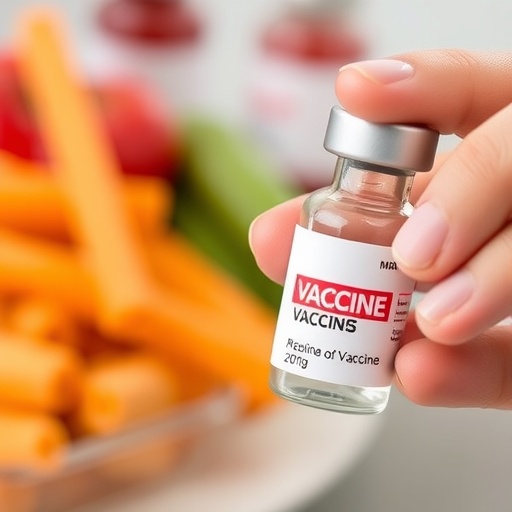In a pioneering advancement that could revolutionize the treatment of allergic diseases, researchers from the Perelman School of Medicine at the University of Pennsylvania in collaboration with Cincinnati Children’s have engineered an innovative mRNA vaccine designed to preclude dangerous allergic responses. This groundbreaking study, recently published in the Journal of Clinical Investigation, signals a transformative shift in allergy therapeutics, leveraging mRNA technology previously validated by COVID-19 vaccines to modulate immune reactions to allergens in mice.
The research team, co-led by Nobel laureate Dr. Drew Weissman and Dr. Marc E. Rothenberg of Cincinnati Children’s, crafted an mRNA vaccine that encodes for proteins mimicking specific allergens. This mediated presentation effectively primes the immune system toward tolerance rather than hypersensitivity. Unlike conventional allergy immunotherapies that rely on repeated allergen injections over extended periods, this approach induces a controlled immune recalibration in response to allergens, reducing the risk of adverse reactions while fostering long-lasting protection.
Mechanistically, the vaccine utilizes lipid nanoparticles (LNPs) to deliver the allergen-encoding mRNA into host cells, where it directs intracellular synthesis of allergen-like proteins. These proteins are then processed and presented by antigen-presenting cells, inducing immunological pathways favoring immune tolerance. When mice vaccinated with this formulation were subsequently exposed to corresponding allergens, they exhibited a substantial reduction in allergic symptoms, including diminished recruitment of eosinophils and other allergy-associated leukocytes.
Detailed immunophenotyping revealed that vaccinated mice produced significantly fewer pro-inflammatory cytokines implicated in allergy pathogenesis, such as interleukin-4 (IL-4) and interleukin-5 (IL-5). Concomitantly, these animals demonstrated lower mucus production in pulmonary tissues and preserved airway function, indicating protection against asthma-like airway hyperresponsiveness. Notably, there was an upregulation of allergen-specific immunoglobulin G (IgG) antibodies, which are believed to competitively inhibit IgE-mediated allergic cascades, further underpinning the immunity conferred by the vaccine.
This novel mRNA allergy vaccine platform offers unparalleled adaptability, whereby sequences encoding diverse allergenic proteins can be integrated into a single or multivalent vaccine formulation. Such versatility suggests broad applicability for various allergic diseases ranging from seasonal rhinitis caused by pollen to severe food allergies—many of which currently lack effective prophylactic vaccines. The capacity to modulate sensitization to multiple allergens simultaneously could usher in a new era of personalized allergy management.
The implications of this technology extend beyond efficacy. The mRNA vaccine platform inherently accelerates development timelines, enabling researchers to rapidly design, synthesize, and test vaccines against emerging allergenic triggers. This is especially crucial in light of the rising global prevalence of allergic disorders and the complex, heterogeneous nature of individual patient allergen profiles. The safety and robust immune priming demonstrated in this preclinical model augur well for translational prospects in human trials.
Dr. Weissman emphasized the profound social and clinical importance of these findings, noting that food allergies particularly impose severe lifestyle limitations and anxiety due to risks of anaphylaxis. A vaccine that prevents sensitization or diminishes allergic severity could significantly enhance quality of life and reduce healthcare burdens associated with emergency care for allergic reactions. Beyond food allergies, the approach holds promise for mitigating asthma exacerbations linked to allergen exposure, underscoring its potential multifaceted impact.
The study also serves as a compelling proof-of-concept that mRNA vaccines can transcend infectious disease paradigms, extending their scope to chronic immunological disorders where dysregulated immune responses contribute to disease pathology. Similar strategies may, in the future, be tailored to autoimmune diseases or other immune-mediated conditions, heralding a new frontier in immunotherapy.
Future research endeavours are focused on detailed safety profiling in human subjects, optimizing dosing parameters, and determining the longevity of immunological protection elicited by the vaccine. Additionally, critical questions remain regarding how many allergen-specific mRNAs can be safely multiplexed within a single vaccine dose without eliciting off-target effects or immune interference.
This innovative work benefited from funding by the Food Allergy Fund and support from the National Institute of Diabetes and Digestive and Kidney Diseases (NIDDK), reinforcing the critical role of targeted research investments in catalyzing medical breakthroughs. The research teams’ commitment to harnessing proven vaccine technologies for allergy therapy signals exciting developments ahead in combating a growing public health challenge.
Notably, the lipid nanoparticle delivery system integral to this vaccine underscores the synergy of nanotechnology and molecular biology in enabling precise immunomodulation. As researchers refine the biochemical and immunological parameters of this platform, the potential to customize vaccines for individual allergen profiles or specific patient immunotypes becomes increasingly tangible.
In summary, this advance represents a seminal leap forward, potentially supplanting traditional desensitization therapies with safe, effective, and adaptable mRNA vaccines. For the millions worldwide grappling with life-threatening allergic diseases, this novel approach offers renewed hope for prevention and management, leveraging the transformative power of RNA-based immunotherapy to rewrite allergy treatment paradigms.
Subject of Research: Allergen-specific mRNA-Lipid Nanoparticle therapy for the prevention and treatment of experimental allergy
Article Title: Allergen-Specific mRNA-Lipid Nanoparticle Therapy for Prevention and Treatment of Experimental Allergy in Mice
News Publication Date: 23-Sep-2025
Web References:
- Perelman School of Medicine: https://www.med.upenn.edu/
- University of Pennsylvania: https://www.upenn.edu/
- Cincinnati Children’s: https://www.cincinnatichildrens.org/
- Journal of Clinical Investigation article: https://www.jci.org/articles/view/194080
Keywords: RNA, Vaccine development, Allergic reactions




